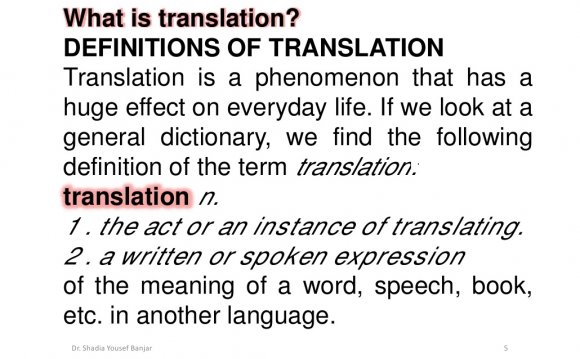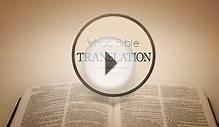
Translation is the transmittal of written text from one language into another. Although the terms translation and interpretation are often used interchangeably, by strict definition, translation Refers to the written language, and interpretation to the spoken word.Translation is the action of interpretation of the meaning of a text, and subsequent production of an equivalent text, also called a translation, that communicates the same message in another language. The text to be translated is called the source text, and the language it is to be translated into is called the target language; the final product is sometimes called the "target text."
Translation must take into account constraints that include context, the rules of grammar of the two languages, their writing conventions, and their idioms. A common misconception is that there exists a simple word-for-word correspondence between any two languages, and that translation is a straightforward mechanical process. A word-for-word translation does not take into account context, grammar, conventions, and idioms.
Who Uses Translation Services?Businesses often seek translation services in an effort to serve their customers better and keep up with their demands. As this world gets more and more competitive, it's imperative that businesses convey their message clearly and accurately to their customers. Translation mistakes can potentially affect a company's reputation and result in financial loss.
Generally, most industries have a need for this type of service. The legal field has the need for the translation of depositions, petitions, court records, and court proceedings. Law enforcement may need to have statements translated and the medical field frequently needs medical records and notes translated. Other examples of industries that benefit form document translation services are insurance and financial companies, as well as the media.
As more and more companies make their services available through the Internet, the need for the translation of websites and web content has also grown. Furthermore, talk radio, pod casts, surveys, focus groups, and corporate meetings often need translation services.
Businesses are not the only ones that have a need for document translation. On a personal level, individuals also employ this type of service. Due to more people migrating to different countries in search of a better life, they find themselves in environments that are unfamiliar, including the language. As a result, they may need legal documents translated, such as birth certificates, marriage licenses, passports, contracts, and leases or mortgage contracts.
Translator Jobs
The demand in the translating field is greater than ever before. Many translators work as freelancers and others are employed by international organizations as well as government agencies. Nonprofit and religious organizations also hire or contract the services of translators for document translation. Individuals who work as translators are highly intellectual. Their work is rewarding and satisfying.
You can find forums and boards on the Internet where you can find job advertisements. You'll be able to benefit from other translators' experience and support. Other places to find document translation jobs are newspapers and online job websites. Your local newspaper could be a good source of job leads.
MORE TRANSLATION VIDEO












